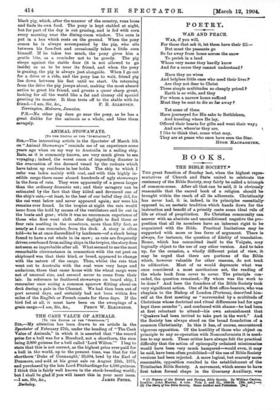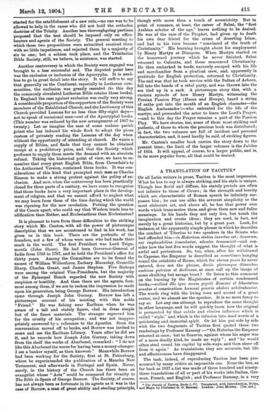THE BIBLE SOCIETY.*
THE great function of Sunday last, when the highest repre- sentatives of Church and State united to celebrate the centenary of the Bible Society, may fairly be called a triumph of common-sense. After all that can be said, it is obviously reasonable that the sacred book of a religion should be brought within the reach of all its adherents. Christianity has never had, it is, indeed, in its principles essentially- opposed to, an esoteric tradition which hands down for the instruction and benefit of a priestly caste some ideal rule of life or ritual of propitiation. No Christian community can answer with an absolute and unconditioned negative the pro- position that all its members have an inherent right to be acquainted with the Bible. Practical limitations may be supported with more or less force of argument. There is always, for instance, the question of fidelity of translation. Rome, which has committed itself to the Vulgate, may logically object to the use of any other version. And to take up, for the occasion, a wholly different point of view, it.
may be urged that there are portions of the Bible which, however valuable for other reasons, do not tend.
to edification. Most of us would deprecate what was once considered a most meritorious act, the reading of the whole book from cover to cover. The principle con- ceded, the question remained,—By whom was the work to be done ? And here the founders of the Bible Society took very significant action. One of its first office-bearers, who was chaplain to the Bishop of London (Porteus), described him-
self at the first meeting as "surrounded by a multitude of Christians whose doctrinal and ritual differences had for ages
kept them asunder "; and confessed with shame—he had been at first reluctant to attend—his own astonishment that "Quakers had been invited to take part in the work." And
the Society has always stood on the broad foundation of a
common Christianity. In this it has, of course, encountered vigorous opposition. Of the hostility of those who object on principle to any co-operation with Nonconformists it is need- less to say much. These critics have always felt the practical difficulty that the action of episcopally ordained missionaries would have been very much hampered—would even, it may be said, have been often prohibited—if the use of Bible Society versions had been rejected. A more logical, but scarcely more reasonable, opposition resulted in the establishment of the Trinitarian Bible Society. A movement, which seems to have first taken formal shape in the Guernsey Auxiliary, was
• (1) History of the British and Foreign Bate Society. By William Canton. London: John Murray.. 4 vols. Vols. L and LE., [30s. net.]- (2) Ths Story of the Bible Society. Same Author and Publisher. Eds.] started for the establishment of a new rule,—no one was to be allowed to help in the cause who did not hold the orthodox doctrine of the Trinity. Another less thoroughgoing partisan proposed that the test should be imposed only on office- bearers and agents of the Society. The general meeting to which these two propositions were submitted received them with no little impatience, and rejected them by a majority of sa to one; but a schism took place, and the Trinitarian Bible Society, still, we believe, in existence, was started.
Another controversy in which the Society were engaged was brought to a less successful end. The disputed point here was the exclusion or inclusion of the Apocrypha. It is need- less to go in great detail into the story. It will suffl,!e to say that generally on the Continent, especially in Lutheran com- munities, the exclusion was greatly resented (to this day the commonly circulated Lutheran Bible retains these books). In England the case against exclusion was really very strong. A considerable proportion of the supporters of the Society were members of the Established Church, and the Lectionary of this Church provided Lessons for no less than fifty-eight days— not to speak of occasional uses—out of the Apocryphal books. (This number was reduced by the new arrangement of 1867 to twenty.) Let us imagine the case of some zealous parish priest who has induced his whole flock to adopt the pious custom of privately reading the Lessons of the day when without the opportunity of attending at church. He wants a supply of Bibles, and finds that they cannot be obtained except at a prohibitory price, and that the Society which professes to supply them meets the demand with an absolute refusal. Taking the historical point of view, we have to re- member that every great English Bible, from Coverdale's to the Authorised Version, contained these books. It was con- siderations of this kind that prompted such men as Charles Simeon to make a strong protest against the policy of ex- clusion. And now, when the controversy has been practically closed for three parts of a century, we have come to recognise that those books have a very important place in the develop- ment of religion, and that we cannot afford to neglect what we may learn from them of the time during which the world was ripening for the new revelation. Putting the question of the Canon apart, who could say that Wisdom tends less to edification than Esther, and Ecclesiasticus than Ecclesiastes?
It is pleasant to turn from these difficulties to the striking story which Mr. Canton, with all the power of picturesque description that we are accustomed to find in his work, has given us in this book. There are the portraits of the founders, not a few of whom were men who had made their mark in the world. The first President was Lord Teig,n- mouth (John Shore). He had been Governor-General of India from 1793 to 1797, and he held the President's office for thirty years. Among the Committee are to be found the names of William Wilberforce, Zachary Macaulay, Granville Sharp, Charles Grant, and James Stephen. Five Bishops were among the original Vice-Presidents, but the majority of the Episcopal Bench regarded the new Society with suspicion or hostility. And then there are the agents, fore- most among them, if we are to reckon the impression he made upon his generation, being George Borrow. His introduction came through Joseph John Gurney. Borrow has left a picturesque account of his meeting with this noble "Friend." He was fishing near Earlham when he was aware of a tall and stately figure, clad in dress simple but of the finest materials. The stranger reproved him for the cruelty of his occupation; and was not inappro- priately answered by a reference to the Apostles. Soon the conversation moved off to books, and Borrow was invited to come and see the Earlham Library. Years after he did see it, and he records how Joseph John Gurney, taking down from the shelf the works of Abarbenel, remarked "I do not like this Abarbenel the worse for having been a money-changer. I am a banker myself, as thou knowest." Meanwhile Borrow had been working for the Society, first at St. Petersburg, where he superintended the publication of a Manchu New Testament, and afterwards in Portugal and Spain. Never, surely, in the history of the Church has there been an evangelist whose "Acts" could be compared for vivacity to The Bible in Spain of George Borrow. The Society, of course, has not always been as fortunate in its agents as it was in the case of Borrow, a man of great ability and sterling principle, though with more than a touch of eccentricity. But in point of romance, at least, the career of Sabat, the "first Arabian scholar of the age," leaves nothing to be desired. He was of the race of the Prophet, had given up to death his own dear friend for the crime of deserting Islam. and had in his turn become "convinced of the truth of Christianity." His learning brought about his employment by Henry Martyn at Dinapore. When Martyn started on the homeward journey which he never finished, Sabat returned to Calcutta, and there renounced Christianity. He then embarked in trade, narrowly escaped with his life and merchandise from a piratical crew, and, apparently in gratitude for English protection, returned to Christianity. The end was that he took service with the Sultan of Acheen, fell into the hands of a rebel party, and was thrown into the sea tied up in a sack. A picturesque story this, with a curious episode of how Henry Martyn, witnessing the Persian Passion Play (Hasan and Hoseyn), heard a string of oaths put into the mouth of an English character—the English Ambassador !—who entreated for the life of the martyr, and persuaded the actor to learn the Lord's Prayer, —and to this day the Prayer remains a part of the Passion Play. We have stories, too, some of them most striking and pathetic, of those to whom the precious book was distributed ; in fact, the two volumes are full of incident and personal characteristics, and, it need hardly be said, of striking figures.
Mr. Canton's smaller book carries the story down to the present time; the limit of the larger volumes is the Jubilee of 1854. It will appeal, of course, to a larger public, and is, in its more popular form, all that could be desired.











































 Previous page
Previous page